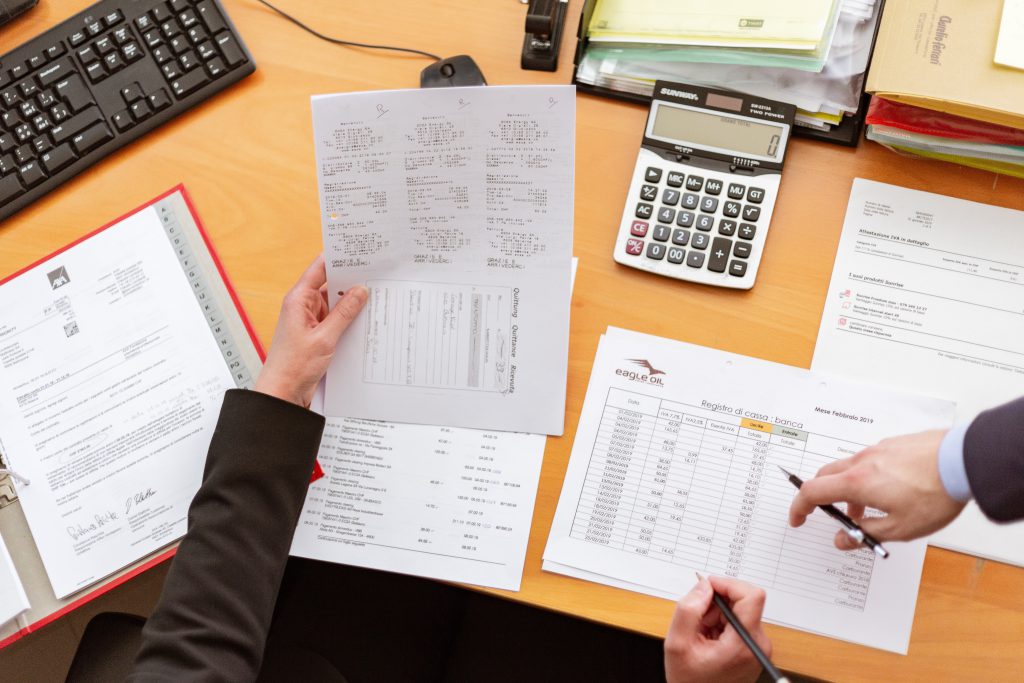How Do I Know if My Product or Service is Taxable?
Every state has its laws in regards to which products and services are subject to sales taxes. These laws vary dramatically, and some states only charge sales tax when a particular item exceeds a specific price.
Of the 45 states that charge sales tax, sales taxes are usually assigned to most retail items, like clothing and accessories. Items that are often exempt from sales taxes include prescription drugs, raw materials, and groceries. These items are instead categorized as “necessities.”
Some states also provide sales tax certificates to non-profit organizations that exempt them from paying sales taxes on certain products.
This topic is particularly complicated for eCommerce business owners or businesses that sell digital products. Their items are often available for anyone in the US, so it’s unclear which state’s laws should be applied. We’ll get to that in just a bit.
The main takeaway here is to check with your state to confirm your product or service’s tax laws.
How Do I Know Which State’s Tax Rates To Charge?
Once it is determined that your product or service is taxable, you must pay taxes for any state categorized as a “tax nexus” for your business. This term refers to your business’s location(s), your goods, and your customers.
If you operate a brick-and-mortar store, you probably have just one nexus state. When more locations come into play, additional nexus states may be established.
Here are the primary factors for establishing nexus states:
- Physical locations: Locations of your business
- Sales Volume: The number of sales you collect in a specific state
- Staff: Location of your employees
- Inventory: Where you store your products
- Distribution: Where your products are shipped from
Do eCommerce Businesses Have to Pay Sales Taxes?
As of 2019, 24 states require Ecommerce businesses to collect and pay sales taxes. However, in most of these states, sales tax is only required for companies that process more than 200 transactions or at least $100,000 in sales per year. But that doesn’t mean you shouldn’t check with your home state to make sure this exemption hasn’t changed.
If you meet those requirements, the next step is to determine if your product is taxable in any of your business’s nexus states. Calculating tax rates for Ecommerce businesses can get pretty complicated and covered in the tax rate section later on.
Are Digital Products Taxable?
Examples of digital products include ebooks, music files, or anything that needs to be downloaded. In most states, sales tax must be collected on these items.
Do Service-Based Businesses Have To Pay Sales Taxes?
You guessed it: sales tax laws for services vary from state to state. In most states, sales tax is not collected for medical services and legal services. Sales tax is more common in services associated with small businesses, like landscaping or nail care.
Certain services are even viewed as products in some states. For example, when an accountant prepares your taxes, the finished paperwork is viewed as a product in some states and services in others.
Which States Do I Have To Register for Sales Tax Permits?
Once you have established your nexus states, you must register for sales tax permits in each of those states. This is free of charge and as simple as visiting each state’s department of revenue website. Registration requires basic information such as your employer identification number, your business’s address, and personal information about its owners.
A sales tax permit allows you to collect, report, and pay sales taxes on your products or services. Reporting, for example, is only possible thanks to your permit’s sales tax ID number.
How To Calculate the Sales Tax Rates for Your Nexus States
There are two types of sales tax rates: destination-based and origin-based. Thirty-eight states have the former, which means that an item is taxed based on the buyer’s location. So, if your business is based in New York but sells to a customer in Florida, that customer must pay the Florida sales tax because Florida is a destination-based state. All local sales taxes for the customer’s location must be collected as well. You would also have to file a Florida sales tax return before the state’s periodic due date. In summary, you must collect the correct sales tax for each customer located in a destination-based state.
As for the twelve states with origin-based sales taxes, the item is taxed based on the seller’s location. California is categorized as an origin-based state, but only in terms of state, county, and city taxes. District taxes, on the other hand, are based on the location of the buyer.
If you only sell products in your state, but you must collect the correct amount from each locality in multiple cities or counties within that state.
How To Collect Sales Tax at Your Point of Sale or Shopping Cart Page
Calculating sales tax is infinitely more manageable thanks to the numerous point-of-sale tools available today. With some of these tools, all you have to do is enter your customers’ locations to calculate the correct state and local sales taxes.
Regardless of how you do your calculations, sales tax must be displayed separately from the item’s original purchase price. Odds are, this will automatically be taken care of by whatever software you are using.
Ecommerce businesses must present sales taxes on their “shopping cart” pages. Software is available for this purpose as well. The sales tax information is already programmed into the system, so you have to input the correct settings.
If you aren’t sure whether you are using your point-of-sale or shopping cart software correctly, don’t be afraid to contact the company. They get calls from confused business owners all the time and will, therefore, be happy to walk you through their system carefully.
How Do I Record Sales Taxes?
Records must be kept of the sales taxes you collect. Thankfully, online accounting tools allow you to set up systems that automatically post sales transactions into a “Sales Tax Payable” liability account. The sales tax you collect from each sale will be accounted for, making the next two stages much easier.
How Often Do I Have To Report Sales Taxes?
In addition to their own due dates for filing sales taxes, each state has a cyclical “reporting period” for sales taxes as well. You must file reports to your state department revenue during each period that explains how much sales tax you have collected throughout a specific time frame. Yes, that time frame varies from state to state. Most states allow small business owners to report sales taxes online.
How To File Sales Tax Returns for Your Nexus States
Tax returns must be paid in every state in which you have a tax permit. Even if you don’t conduct any sales throughout the time frame mentioned in the previous section, you must still file what’s known as a “zero return.” In addition to collecting money that goes towards schools, roads, and other worthy causes, states use tax returns to determine which businesses are still up and running. Many states will, therefore, issue a fine if you don’t submit anything.
Deadlines vary tremendously from state to state and business to business. In some states, sales taxes must be reported and paid each month. Other states require quarterly or annual payments.
The reporting and payment schedule also depends on the sales volume. Businesses with higher sales must typically file sales taxes more frequently. For example, your state might require monthly payments from companies that exceed a particular sales volume and quarterly payments from companies that fall under that volume.
Which States Offer Tax Discounts?
Many states allow you to keep approximately 1% – 2% of the sales tax you collect when you file tax returns on time. Periodic filing takes up a lot of time and energy, and these states are willing to compensate business owners for their hard work and responsibility.
Some states also offer discounts for paying early. Both rewards can lead to massive long-term savings, so it’s highly recommended to take advantage of them. Besides, missing your deadline or failing to file at all will result in a fine (usually around $50). Continuing to make these mistakes could cost you your sales license.
Remembering tax deadlines for multiple states is very difficult. Automated tax filing services, however, will file your sales tax returns on schedule for you.
Sales Taxes: Frequently Asked Questions
The complexity of sales taxes naturally leaves small business owners with myriad questions. Here are some of the most common questions and solutions:
What if I Haven’t Been Collecting and Paying Sales Taxes?
The more sales you make without collecting the appropriate sales tax increases the severity of potential penalties. Luckily, there are at least two solutions.
The first is to contact your state’s tax assessor. After learning what date you should have started collecting sales tax, your tax assessor will tell you what you owe regarding back taxes, fees, and fines.
Another option is using software to calculate what you owe while registering for tax permits in your nexus states. When your first filing date comes round, you will pay your back taxes in addition to what you owe for that period.
It is highly recommended to consult a tax expert while deciding which option to choose. Depending on your state and business, one option could result in a dramatically higher bill than the other.
Of course, you could register for tax permits now, pretend you don’t owe anything, and hope your home state doesn’t come looking for back taxes. This option poses the most risk, especially if there is proof that you knew you were supposed to be collecting or submitting sales taxes but willingly chose not to.
What if I Can’t Afford the Amount of Back Taxes I Owe?
After finding out how much sales tax you owe, you might conclude that you cannot afford to pay that much money while keeping your business running.
Situations like this can be solved with a Voluntary Disclosure Agreement (VDA) with your state. This is a legal agreement that ultimately reduces the amount you owe in back taxes, fees, and fines. Why would the state agree to such an arrangement? Because by coming clean and agreeing to pay back most of what you owe, the state doesn’t have to spend time and money figuring out what you owe and making you pay it back.
VDAs can only be submitted by a SALT (sales and local tax) professional. These services may come with a steep cost because the benefits of the VDA can only be reaped if no mistakes are made. In other words, you should not attempt to submit a VDA on your own.
However, a VDA may not be possible if the state has already contacted you about back taxes. Hence, you should hire a tax professional as soon as you determine that your finances cannot withstand the full amount you owe.
What Happens if I Don’t Collect and File Sales Taxes Correctly?
Contrary to popular belief, the IRS has no direct association with sales taxes. You may have noticed that this guide is yet to mention national sales taxes. That’s because they do not exist in the United States!
Business owners that fail to collect sales taxes will, therefore, not be audited by the IRS. All sales tax issues are handled by your State Department of Revenue or your state taxing authority. Certain states have different names for their taxing authority. In New York, for example, the taxing authority is known as the Department of Taxation and Finance.
What if a Customer Wants To Resell My Product?
Items that are purchased for resale are often exempt from sales taxes. But only individuals with a valid reseller’s permit can capitalize on this policy. So, if a potential customer claims to be a “reseller,” you are entirely within your rights to ask for a permit. You should also make a copy of the reseller’s permit in the event of inquiries from the state.
What if My CPA Doesn’t Know Anything About Sales Taxes?
Your CPA probably isn’t going to be much help when it comes to sales tax issues. That’s not your CPA’s fault: sales tax is not their background. Asking a CPA about sales taxes is like asking your general practitioner to give you a chiropractic examination.
The person you should be asking about all things sales taxes is a SALT expert. These individuals will answer all of your questions and have the experience to stay calm amid a possible tax-related crisis, which happens all the time.
Since most SALT experts work in multiple states, don’t worry about not finding one who works exclusively in your state. They are accustomed to solving complex problems without face-to-face meetings. Your tax preparer, on the other hand, should ideally be based in your state.
Do Home-Based Businesses Have To Collect and Pay Sales Taxes?
Once you have determined that your product or service is taxable, the location you make sales becomes a tax nexus. This includes your home. Therefore, owners of home-based businesses must register for a tax permit so they can collect, report, and pay sales taxes.
Do I Have To Collect and Pay Taxes for Just One Out-of-State Sale?
We’ve already touched on this, but it’s such a confusing subject that it deserves a revisit. If you own an eCommerce business (which means you sell exclusively online with no physical location), you only have to collect and pay sales taxes for destination-based states in which you exceed the threshold mentioned above for sales volume.
On the other hand, owners of traditional businesses must collect and pay sales taxes for destination-based states, even if you have only sold one item to one customer in that state.
It’s All About Finding the Right Tools
As you can see, sales taxes become much less stressful when you have the right tools at your disposal. Yes, shopping for these tools is yet another chore associated with sales tax. But the amount of time you’ll save by choosing the right tools easily outweighs the amount of time it takes to search for them.
Still, the most useful resource for simplifying sales taxes is experience. Sales taxes are a significant headache for new business owners, but after a few years, having to file every month or every few months will be a breeze. The only truly irreparable mistake you can make is not asking for help. And thanks to the world wide web, obtaining sound advice from credible tax experts is easier than ever.













